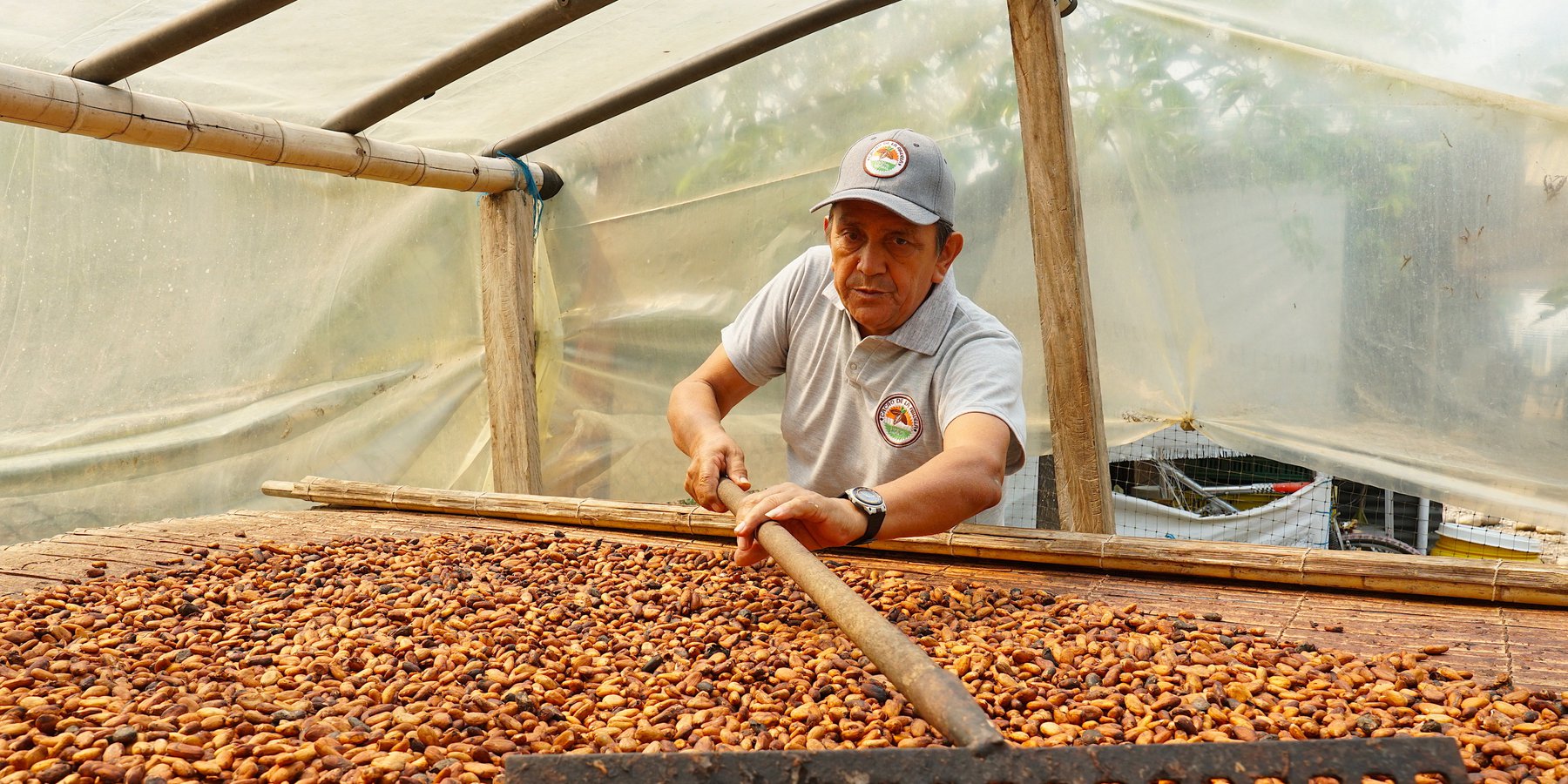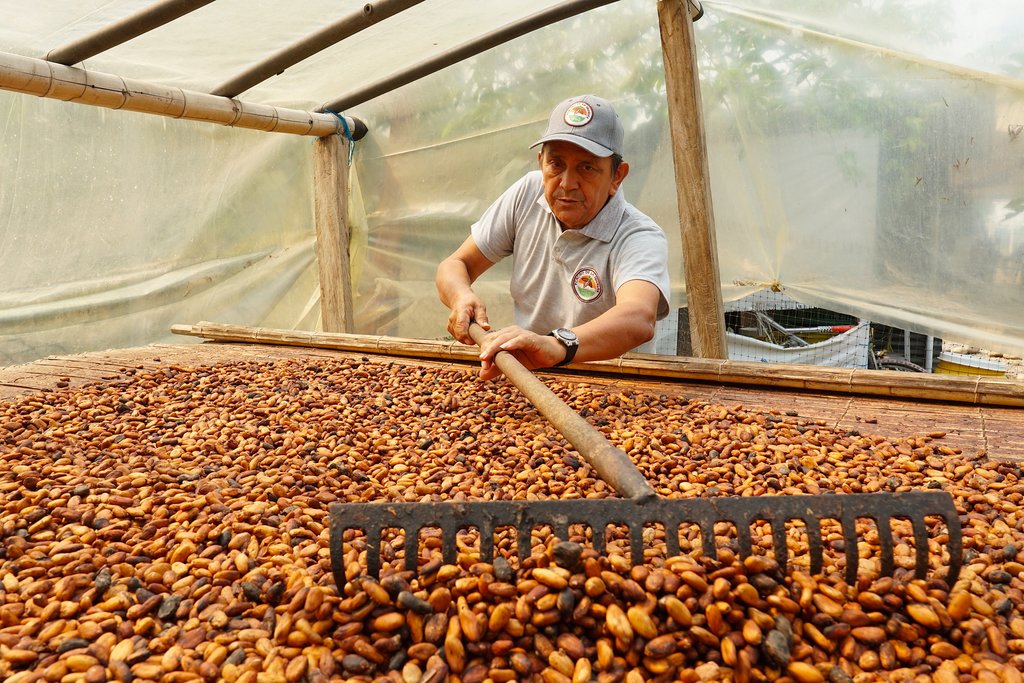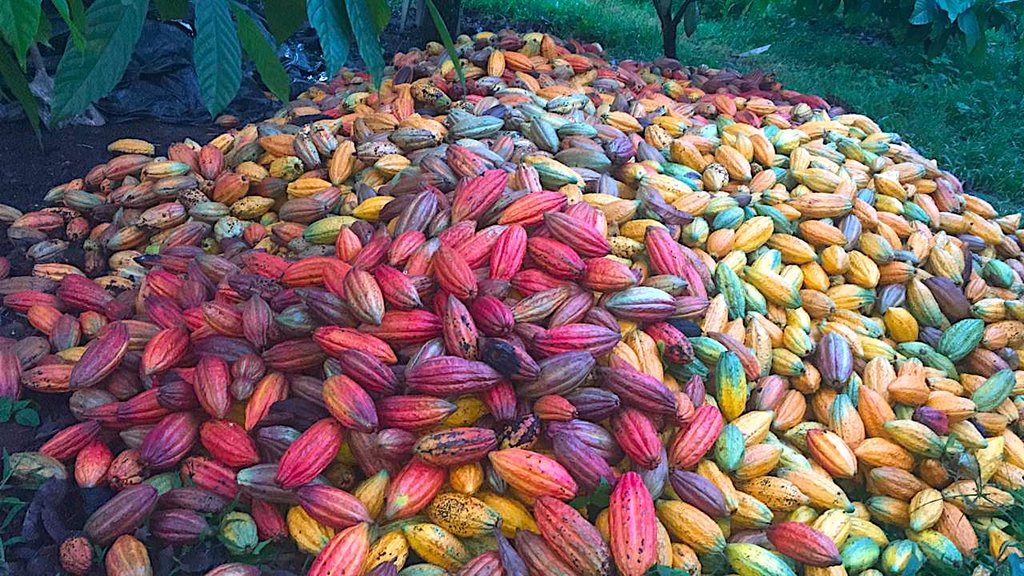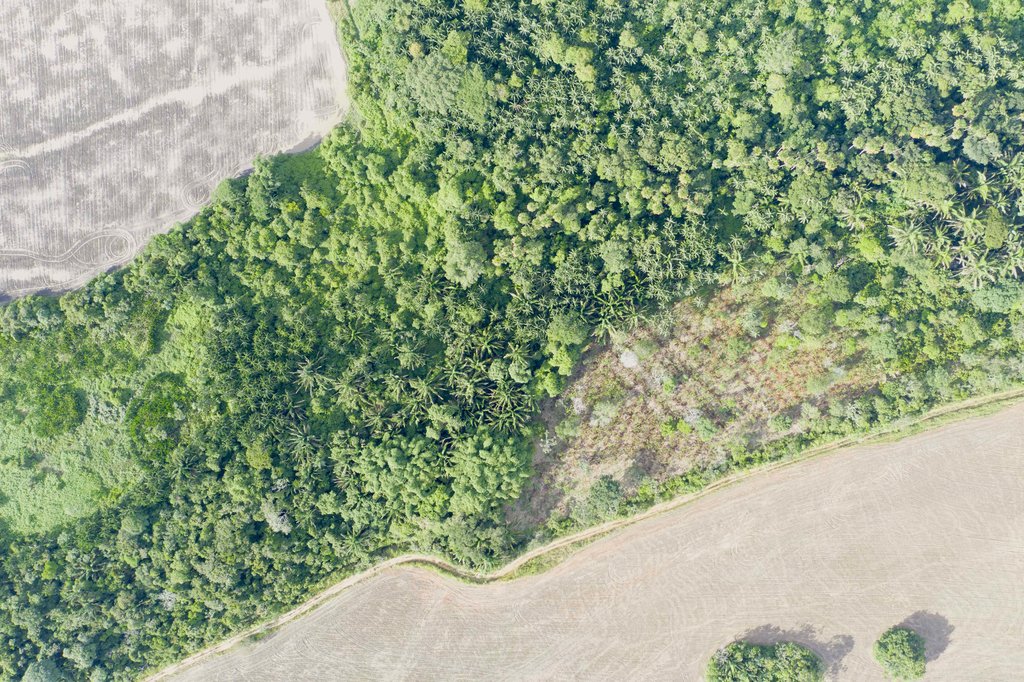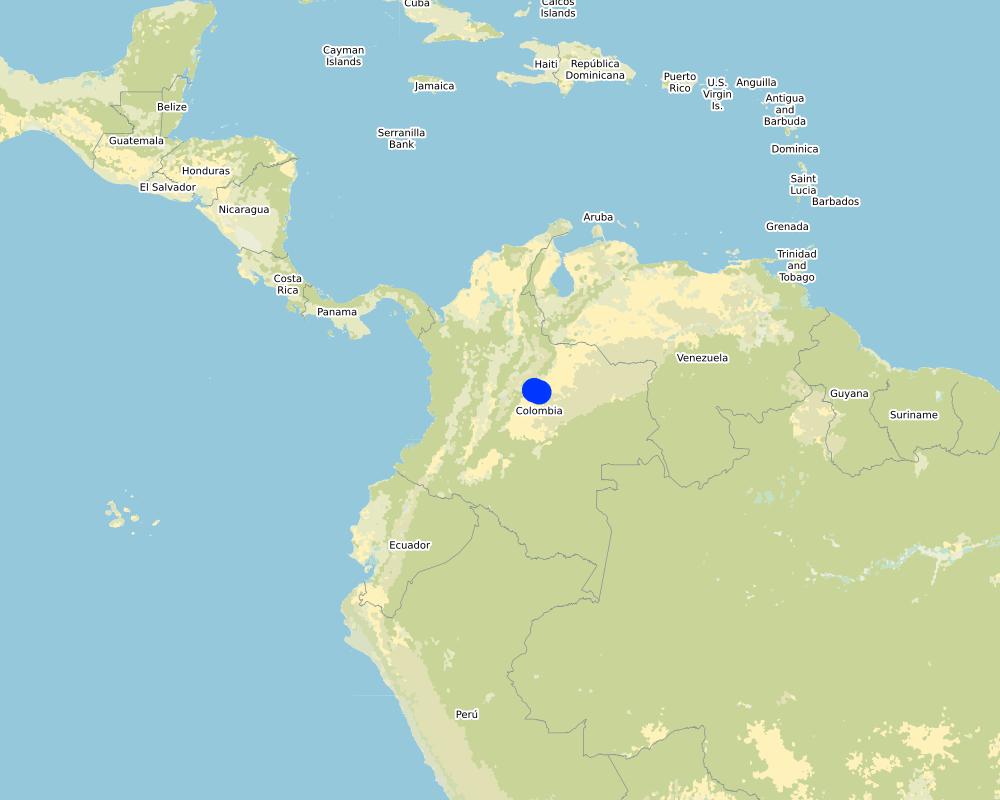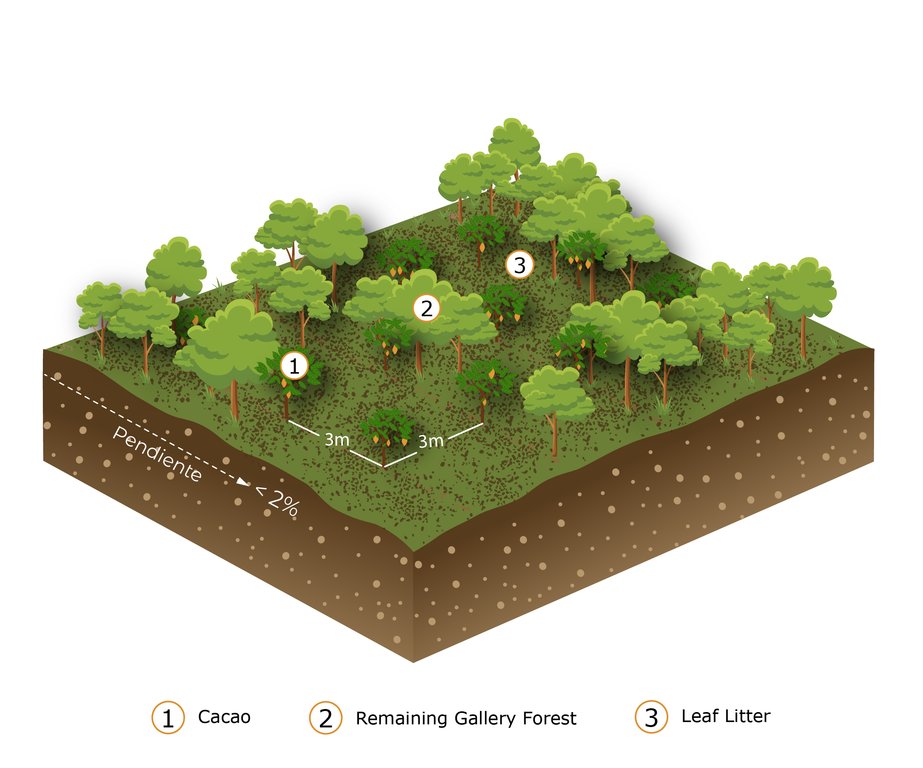Agroforestry system of cacao and gallery forest [โคลอมเบีย]
- ผู้สร้างสรรค์:
- การอัพเดท:
- ผู้รวบรวม: Luisa F. Vega
- ผู้เรียบเรียง: Hanspeter Liniger
- ผู้ตรวจสอบ: Hanspeter Liniger
cacao
technologies_5763 - โคลอมเบีย
ดูส่วนย่อย
ขยายทั้งหมด ย่อทั้งหมด1. ข้อมูลทั่วไป
1.2 รายละเอียดที่ติดต่อได้ของผู้รวบรวมและองค์กรที่เกี่ยวข้องในการประเมินและการจัดเตรียมทำเอกสารของเทคโนโลยี
วิทยากรหลัก
ผู้ใช้ที่ดิน:
Martinez Ana Silvia
Maracaibo Farm
โคลอมเบีย
ผู้ใช้ที่ดิน:
Medina Rafael
Maracaibo Farm
โคลอมเบีย
ชื่อของโครงการซึ่งอำนวยความสะดวกในการทำเอกสารหรือการประเมินเทคโนโลยี (ถ้าเกี่ยวข้อง)
Onsite and Offsite Benefits of SLMชื่อขององค์กรซึ่งอำนวยความสะดวกในการทำเอกสารหรือการประเมินเทคโนโลยี (ถ้าเกี่ยวข้อง)
Cesos - Centro de Estudios para la Sostenibilidad - Fundación Wajari (Wajari) - โคลอมเบีย1.3 เงื่อนไขการใช้ข้อมูลที่ได้บันทึกผ่านทาง WOCAT
ผู้รวบรวมและวิทยากรหลักยอมรับเงื่อนไขเกี่ยวกับการใช้ข้อมูลที่ถูกบันทึกผ่านทาง WOCAT:
ใช่
1.4 การเปิดเผยเรื่องความยั่งยืนของเทคโนโลยีที่ได้อธิบายไว้
เทคโนโลยีที่ได้อธิบายไว้นี้เป็นปัญหาของความเสื่อมโทรมโทรมของที่ดินหรือไม่ จึงไม่ได้รับการยอมรับว่าเป็นเทคโนโลยีเพื่อการจัดการที่ดินอย่างยั่งยืน:
ไม่ใช่
2. การอธิบายลักษณะของเทคโนโลยี SLM
2.1 การอธิบายแบบสั้น ๆ ของเทคโนโลยี
คำจำกัดความของเทคโนโลยี:
Agroforestry system of cacao crop under gallery forest shadow as family agriculture. It is located at the Pozetas Stream, in the Cusiana River Basin, Floodable Savannas of the Colombian Orinoco.
2.2 การอธิบายแบบละเอียดของเทคโนโลยี
คำอธิบาย:
The agroforestry system of cacao crop planted under gallery forest is a private farmer initiative for family agriculture. The Crop is located in the gallery forest of Pozetas Stream, in the Cusiana River Basin. It is at the beginning of the Orinoco Floodable Savanas (250m a.s.l.). Municipality of Tauramena (Casanare), Colombia.
The cacao growths in an area of 4 hectares, being considered small farming, according to the Orinoco Regional scale. The cacao density is 1080 plants/hectare and the distance between plants is 3m. In this area, after tree thinning, the forest occupies 30% approximately. Some of the common tree species are Cedrus spp., Ficus spp. and Anadenanthera peregrina, among others.
The purpose of the technology is to use the gallery forest land in a productive way to generate income for the family, while keeping part of the forest. As cacao needs some shadow, specially in early growth stage, it is planted under the forest creating the agroforestry system.
Cacao seed germination and seedling preparation, gallery forest thinning and soil improvement with lime and organic fertilizer (rice husk), and finally planting, are the main establishment activities. Then the maintenance activities include cutting weeds, trimming cacao trees and fertilization every 2-3 months.
The cacao crop has produced fruits since the sixth year of being planted (2010) and is harvested every two weeks. It presents two yield peaks, the first one is in May-June and the second one in October-November. However it produces fruits along the year.
This technology provides additional income to the family, while conserving part of the original gallery forest. The more complex and diverse production system might favored pollination and crop health. The technology compared with other land uses around it such as oil palm tree and rice is more sustainable and it is something the land users prefer. They also like the value added to the cacao beens by processing their self the cacao beens to produce hand made 100% cacao bars for drinking chocolate.
2.3 รูปภาพของเทคโนโลยี
2.5 ประเทศภูมิภาค หรือสถานที่ตั้งที่เทคโนโลยีได้นำไปใช้และได้รับการครอบคลุมโดยการประเมินนี้
ประเทศ:
โคลอมเบีย
ภูมิภาค/รัฐ/จังหวัด:
Casanare
ข้อมูลจำเพาะเพิ่มเติมของสถานที่ตั้ง :
Municipality of Tauramena, Rural District of Iquia
ระบุการกระจายตัวของเทคโนโลยี:
- กระจายไปอย่างสม่ำเสมอในพื้นที่
If the Technology is evenly spread over an area, specify area covered (in km2):
0.04
If precise area is not known, indicate approximate area covered:
- < 0.1 ตร.กม.(10 เฮกตาร์)
Is/are the technology site(s) located in a permanently protected area?
ไม่ใช่
แสดงความคิดเห็น:
The gallery forest should be protected according to the Colombian Environmental Legislation, however in most of the cases, its protections is in land users hands.
Map
×2.6 วันที่การดำเนินการ
ระบุปีที่ใช้:
2010
2.7 คำแนะนำของเทคโนโลยี
ให้ระบุว่าเทคโนโลยีถูกแนะนำเข้ามาอย่างไร:
- ด้วยการริเริ่มของผู้ใช้ที่ดินเอง
ความคิดเห็น (ประเภทของโครงการ เป็นต้น) :
It is a private initiative, introduced by a small farmer family to use the forest. They have use a bank loan to establish the cacao crop.
3. การจัดประเภทของเทคโนโลยี SLM
3.1 วัตถุประสงค์หลักของเทคโนโลยี
- ปรับตัวเข้ากับการเปลี่ยนแปลงภูมิอากาศของโลก สภาพภูมิอากาศที่รุนแรงและผลกระทบ
- สร้างผลกระทบทางด้านเศรษฐกิจที่เป็นประโยชน์
3.2 ประเภทของการใช้ที่ดินในปัจจุบันที่ได้นำเทคโนโลยีไปใช้
Land use mixed within the same land unit:
ใช่
Specify mixed land use (crops/ grazing/ trees):
- วนเกษตร (Agroforestry)

พื้นที่ปลูกพืช
- การปลูกไม้ยืนต้น ไม้พุ่ม
Tree and shrub cropping - Specify crops:
- cacao
ระบุ:
Permanent along the year.
Is intercropping practiced?
ไม่ใช่
Is crop rotation practiced?
ไม่ใช่
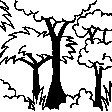
ป่า/พื้นที่ทำไม้
- ป่ากึ่งธรรมชาติ / พื้นที่ทำไม้
(Semi-)natural forests/ woodlands: Specify management type:
- การตัดไม้ที่มีคัดเลือก (Selective felling)
- Tropical gallery forest in floodable savanna
Type of tree:
- Cedrus species
- Anadenanthera peregrina, Ficus spp.,
Are the trees specified above deciduous or evergreen?
- evergreen
ผลิตภัณฑ์และบริการ:
- ไม้ที่นำมาทำเป็นเชื้อเพลิง
- การป้องกันภัยธรรมชาติ
- shadow
3.3 Has land use changed due to the implementation of the Technology?
Has land use changed due to the implementation of the Technology?
- Yes (Please fill out the questions below with regard to the land use before implementation of the Technology)
Land use mixed within the same land unit:
ไม่ใช่

ป่า/พื้นที่ทำไม้
- ป่ากึ่งธรรมชาติ / พื้นที่ทำไม้
(Semi-)natural forests/ woodlands: Specify management type:
- การใช้ประโยชน์จากป่า ยกเว้นไม้
- Tropical Andean Foothill Forest
Type of tree:
- Cedrus species
- Anadenanthera peregrina, Ficus spp.
Are the trees specified above deciduous or evergreen?
- evergreen
ผลิตภัณฑ์และบริการ:
- ไม้ที่นำมาทำเป็นเชื้อเพลิง
- การอนุรักษ์ / ป้องกันธรรมชาติ
- การป้องกันภัยธรรมชาติ
3.4 การใช้น้ำ
การใช้น้ำของที่ดินที่มีการใช้เทคโนโลยีอยู่:
- น้ำฝนร่วมกับการชลประทาน
แสดงความคิดเห็น:
During rainy season (April-November), rain provides enough water for the cacao crop. During dry season (December-March), when there is almost not rain, the cacao is irrigated by channels.
3.5 กลุ่ม SLM ที่ตรงกับเทคโนโลยีนี้
- การปลูกป่าร่วมกับพืช
- การลดความเสี่ยงจากภัยพิบัติบนพื้นฐานของระบบนิเวศ
3.6 มาตรการ SLM ที่ประกอบกันเป็นเทคโนโลยี
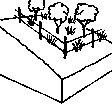
มาตรการอนุรักษ์ด้วยการจัดการ
- M1: การเปลี่ยนรูปแบบของการใช้ประโยชน์ที่ดิน
- M5: การควบคุมหรือการเปลี่ยนแปลงขององค์ประกอบของชนิดพันธุ์
3.7 รูปแบบหลักของการเสื่อมโทรมของที่ดินที่ได้รับการแก้ไขโดยเทคโนโลยี
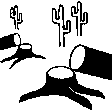
การเสื่อมโทรมของดินทางด้านชีวภาพ
- Bh (Loss of habitat): การสูญเสียแหล่งที่อยู่
- Bq (Quantity/biomass decline): การลดลงของปริมาณหรือมวลชีวภาพ
3.8 การป้องกัน การลดลง หรือการฟื้นฟูความเสื่อมโทรมของที่ดิน
ระบุเป้าหมายของเทคโนโลยีกับความเสื่อมโทรมของที่ดิน:
- ลดความเสื่อมโทรมของดิน
แสดงความคิดเห็น:
The agroforestry system of cacao and gallery forest reduces land degradation compared with other neighboring land uses, such as extensive rice fields.
4. ข้อมูลจำเพาะด้านเทคนิค กิจกรรมการนำไปปฏิบัติใช้ ปัจจัยนำเข้า และค่าใช้จ่าย
4.1 แบบแปลนทางเทคนิคของเทคโนโลยี
ข้อมูลจำเพาะด้านเทคนิค (แบบแปลนทางเทคนิคของเทคโนโลยี):
In the agroforestry system of cacao and gallery forest, the cacao trees are planted, having 3 m distance between them. The native forest occupies 30% approximately, of the system and provides shadow to the cacao trees. Shadow is important for the good development of cacao, especially in early stages. Additionally, the forest increases system complexity, diversity and balance, enhancing crop pollination and health and mitigating climate change impacts, such as high temperature and storms. The leaf litter from the cacao and the forest are also an important source of organic matter for soil enrichment.
ผู้เขียน:
Diego Orduz and Luisa F. Vega
วันที่:
27/04/2020
4.2 ข้อมูลทั่วไปเกี่ยวกับการคำนวณปัจจัยนำเข้าและค่าใช้จ่าย
ให้ระบุว่าค่าใช้จ่ายและปัจจัยนำเข้าได้รับการคำนวณอย่างไร:
- ต่อพื้นที่ที่ใช้เทคโนโลยี
ระบุขนาดและหน่วยพื้นที่:
4 hectares
อื่นๆ หรือสกุลเงินประจำชาติ (ระบุ):
Colombian Pesos
If relevant, indicate exchange rate from USD to local currency (e.g. 1 USD = 79.9 Brazilian Real): 1 USD =:
3750.0
ระบุค่าเฉลี่ยของค่าจ้างในการจ้างแรงงานต่อวัน:
45000
4.3 กิจกรรมเพื่อการจัดตั้ง
| กิจกรรม | Timing (season) | |
|---|---|---|
| 1. | Seed germination | Enero |
| 2. | Plant nursery establishment | Febrero |
| 3. | Clear felling of 70% of native forest in the area | Febrero |
| 4. | Sow hole digging | April-May (beginning of rainy season) |
| 5. | Addition of lime and rice husk to the sow hole | April-May (beginning of rainy season) |
| 6. | Cacao seedling planting in field | April-May (beginning of rainy season) |
4.4 ค่าใช้จ่ายของปัจจัยนำเข้าที่จำเป็นสำหรับการจัดตั้ง
| ปัจจัยนำเข้า | หน่วย | ปริมาณ | ค่าใช้จ่ายต่อหน่วย | ค่าใช้จ่ายทั้งหมดต่อปัจจัยนำเข้า | %ของค่าใช้จ่ายที่ก่อให้เกิดขึ้นโดยผู้ใช้ที่ดิน | |
|---|---|---|---|---|---|---|
| แรงงาน | Forest thinning to open cropland | ha | 4.0 | 150000.0 | 600000.0 | 100.0 |
| แรงงาน | Sow hole preparation and seedling planting | ha | 4.0 | 575000.0 | 2300000.0 | 100.0 |
| วัสดุด้านพืช | Cacao seeds | seed | 5400.0 | 25.0 | 135000.0 | 100.0 |
| วัสดุด้านพืช | cacao seedlings | seedling | 5000.0 | 500.0 | 2500000.0 | 100.0 |
| ปุ๋ยและสารฆ่า/ยับยั้งการเจริญเติบโตของสิ่งมีชีวิต (ไบโอไซด์) | Lime sack | 50 kg | 10.0 | 12000.0 | 120000.0 | 100.0 |
| ปุ๋ยและสารฆ่า/ยับยั้งการเจริญเติบโตของสิ่งมีชีวิต (ไบโอไซด์) | Rice husk | container | 1.0 | 400000.0 | 400000.0 | 100.0 |
| ค่าใช้จ่ายทั้งหมดของการจัดตั้งเทคโนโลยี | 6055000.0 | |||||
| Total costs for establishment of the Technology in USD | 1614.67 | |||||
4.5 การบำรุงรักษาสภาพหรือกิจกรรมที่เกิดขึ้นเป็นประจำ
| กิจกรรม | ช่วงระยะเวลา/ความถี่ | |
|---|---|---|
| 1. | Cutting of weeds, specially around each cacao tree | Every 2 months |
| 2. | Cacao tree trimming | Every 2 months |
| 3. | Fertilization | Every 2-3 months |
| 4. | Harvesting | Every 2 weeks |
4.6 ค่าใช้จ่ายของปัจจัยนำเข้าและกิจกรรมที่เกิดขึ้นเป็นประจำที่ต้องการการบำรุงรักษา (ต่อปี)
| ปัจจัยนำเข้า | หน่วย | ปริมาณ | ค่าใช้จ่ายต่อหน่วย | ค่าใช้จ่ายทั้งหมดต่อปัจจัยนำเข้า | %ของค่าใช้จ่ายที่ก่อให้เกิดขึ้นโดยผู้ใช้ที่ดิน | |
|---|---|---|---|---|---|---|
| แรงงาน | Cutting of weeds, specially around each cacao tree | day | 18.0 | 45000.0 | 810000.0 | 100.0 |
| แรงงาน | Cacao tree trimming | day | 12.0 | 45000.0 | 540000.0 | 100.0 |
| แรงงาน | Fertilization and soil amendment with lime | day | 13.0 | 45000.0 | 585000.0 | 100.0 |
| แรงงาน | Harvesting | day | 24.0 | 45000.0 | 1080000.0 | 100.0 |
| อุปกรณ์ | Manual tools (e.g. machete, trimmer, shovel) | kit | 1.0 | 150.0 | 150.0 | 100.0 |
| ปุ๋ยและสารฆ่า/ยับยั้งการเจริญเติบโตของสิ่งมีชีวิต (ไบโอไซด์) | Lime sack | 50 Kg | 10.0 | 12000.0 | 120000.0 | 100.0 |
| ปุ๋ยและสารฆ่า/ยับยั้งการเจริญเติบโตของสิ่งมีชีวิต (ไบโอไซด์) | Fertilizer sack | 50 Kg | 40.0 | 96000.0 | 3840000.0 | 100.0 |
| ค่าใช้จ่ายทั้งหมดของการบำรุงรักษาสภาพเทคโนโลยี | 6975150.0 | |||||
| Total costs for maintenance of the Technology in USD | 1860.04 | |||||
4.7 ปัจจัยสำคัญที่สุดที่มีผลกระทบต่อค่าใช้จ่าย
ปัจจัยสำคัญที่สุดที่มีผลกระทบต่อค่าใช้จ่ายต่างๆ:
The plant material from seeds to seedlings are the highest cost for the technology establishment. Then, the fertilization is an important maintenance cost.
5. สิ่งแวดล้อมทางธรรมชาติและของมนุษย์
5.1 ภูมิอากาศ
ฝนประจำปี
- < 250 ม.ม.
- 251-500 ม.ม.
- 501-750 ม.ม.
- 751-1,000 ม.ม.
- 1,001-1,500 ม.ม.
- 1,501-2,000 ม.ม.
- 2,001-3,000 ม.ม.
- 3,001-4,000 ม.ม.
- > 4,000 ม.ม.
ข้อมูลจำเพาะ/ความคิดเห็นเรื่องปริมาณน้ำฝน:
The technology is located between 2000-2200 mm isohyets. The rain season occurs from April to November and dry season from December to March.
ระบุชื่อของสถานีตรวดวัดอากาศที่ใช้อ้างอิงคือ:
Precipitation map of the Municipality of Tauramena (2015)
เขตภูมิอากาศเกษตร
- ชื้น
5.2 สภาพภูมิประเทศ
ค่าเฉลี่ยความลาดชัน:
- ราบเรียบ (0-2%)
- ลาดที่ไม่ชัน (3-5%)
- ปานกลาง (6-10%)
- เป็นลูกคลื่น (11-15%)
- เป็นเนิน (16-30%)
- ชัน (31-60%)
- ชันมาก (>60%)
ธรณีสัณฐาน:
- ที่ราบสูง/ที่ราบ
- สันเขา
- ไหล่เขา
- ไหล่เนินเขา
- ตีนเนิน
- หุบเขา
ระดับความสูง:
- 0-100 เมตร
- 101-500 เมตร
- 501-1,000 เมตร
- 1,001-1,500 เมตร
- 1,501-2,000 เมตร
- 2,001-2,500 เมตร
- 2,501-3,000 เมตร
- 3,001-4,000 เมตร
- > 4,000 เมตร
ให้ระบุถ้าเทคโนโลยีได้ถูกนำไปใช้:
- ไม่เกี่ยวข้อง
ความคิดเห็นและข้อมูลจำเพาะเพิ่มเติมเรื่องสภาพภูมิประเทศ:
The technology takes place in the transition from the Andes to the Orinoco Floodable Savannas which topography is flat.
5.3 ดิน
ค่าเฉลี่ยความลึกของดิน:
- ตื้นมาก (0-20 ซ.ม.)
- ตื้น (21-50 ซ.ม.)
- ลึกปานกลาง (51-80 ซ.ม.)
- ลึก (81-120 ซ.ม.)
- ลึกมาก (>120 ซ.ม.)
อินทรียวัตถุในดิน:
- สูง (>3%)
(ถ้ามี) ให้แนบคำอธิบายเรื่องดินแบบเต็มหรือระบุข้อมูลที่มีอยู่ เช่น ชนิดของดิน ค่า pH ของดินหรือความเป็นกรดของดิน ความสามารถในการแลกเปลี่ยนประจุบวก ไนโตรเจน ความเค็ม เป็นต้น:
Fine and coarse mixed alluvial material.
Association: Plinthic Tropaquepts; typic quartzipsamme
Poor drained, low PH and fertility.
According to the Soils of Casanare Department Map. 1:100.000. Agustin Codazzi Geographic Institute. Colombia
5.4 ความเป็นประโยชน์และคุณภาพของน้ำ
ระดับน้ำใต้ดิน:
<5 เมตร
น้ำไหลบ่าที่ผิวดิน:
เกินพอ
คุณภาพน้ำ (ที่ยังไม่ได้บำบัด):
เป็นน้ำเพื่อการดื่มที่ไม่ดี (จำเป็นต้องได้รับการบำบัด)
Water quality refers to:
surface water
ความเค็มของน้ำเป็นปัญหาหรือไม่:
ไม่ใช่
กำลังเกิดน้ำท่วมในพื้นที่หรือไม่:
ใช่
บ่อยครั้ง:
เป็นครั้งเป็นคราว
ความคิดเห็นและข้อมูลจำเพาะเพิ่มเติมเรื่องคุณภาพและปริมาณน้ำ:
Rainy season occurs from April to November, during these months, especially July and October there is excess of water availability. Then, during dry season, especially at the end in March, water availability is scarce.
5.5 ความหลากหลายทางชีวภาพ
ความหลากหลายทางชนิดพันธุ์:
- สูง
ความหลากหลายของแหล่งที่อยู่:
- สูง
ความคิดเห็นและข้อมูลจำเพาะเพิ่มเติมของความหลากหลายทางชีวภาพ:
Gallery forests along the streams and rivers of the Orinoco Basin present higher biodiversity in comparison to the surrounding savanna. In general the Orinoco basin is recognized as Global Outstanding Ecoregion (WWF).
5.6 ลักษณะของผู้ใช้ที่ดินที่นำเทคโนโลยีไปปฏิบัติใช้
อยู่กับที่หรือเร่ร่อน:
- อยู่กับที่
แนวทางการตลาดของระบบการผลิต:
- mixed (subsistence/ commercial)
รายได้ที่มาจากนอกฟาร์ม:
- 10-50% ของรายได้ทั้งหมด
ระดับของความมั่งคั่งโดยเปรียบเทียบ:
- พอมีพอกิน
เป็นรายบุคคล/ครัวเรือน:
- เป็นรายบุคคล/ครัวเรือน
ระดับของการใช้เครื่องจักรกล:
- การใช้เครื่องจักรหรือเครื่องยนต์
เพศ:
- หญิง
- ชาย
อายุของผู้ใช้ที่ดิน:
- ผู้สูงอายุ
ระบุลักษณะอื่นๆที่เกี่ยวข้องของผู้ใช้ที่ดิน:
The technology is implemented by an elderly couple of small farmers.
5.7 Average area of land used by land users applying the Technology
- < 0.5 เฮกตาร์
- 0.5-1 เฮกตาร์
- 1-2 เฮกตาร์
- 2-5 เฮกตาร์
- 5-15 เฮกตาร์
- 15-50 เฮกตาร์
- 50-100 เฮกตาร์
- 100-500 เฮกตาร์
- 500-1,000 เฮกตาร์
- 1,000-10,000 เฮกตาร์
- >10,000 เฮกตาร์
พิจารณาว่าเป็นขนาดเล็ก กลาง หรือขนาดใหญ่ (ซึ่งอ้างอิงถึงบริบทระดับท้องถิ่น):
- ขนาดกลาง
5.8 กรรมสิทธิ์ในที่ดิน สิทธิในการใช้ที่ดินและสิทธิในการใช้น้ำ
กรรมสิทธิ์ในที่ดิน:
- รายบุคคล ได้รับสิทธิครอบครอง
สิทธิในการใช้ที่ดิน:
- รายบุคคล
สิทธิในการใช้น้ำ:
- เช่า
Are land use rights based on a traditional legal system?
ใช่
ระบุ:
The land owners got the land from parent´s heritage.
5.9 การเข้าถึงบริการและโครงสร้างพื้นฐาน
สุขภาพ:
- จน
- ปานกลาง
- ดี
การศึกษา:
- จน
- ปานกลาง
- ดี
ความช่วยเหลือทางด้านเทคนิค:
- จน
- ปานกลาง
- ดี
การจ้างงาน (เช่น ภายนอกฟาร์ม):
- จน
- ปานกลาง
- ดี
ตลาด:
- จน
- ปานกลาง
- ดี
พลังงาน:
- จน
- ปานกลาง
- ดี
ถนนและการขนส่ง:
- จน
- ปานกลาง
- ดี
น้ำดื่มและการสุขาภิบาล:
- จน
- ปานกลาง
- ดี
บริการด้านการเงิน:
- จน
- ปานกลาง
- ดี
6. ผลกระทบและสรุปคำบอกกล่าว
6.1 ผลกระทบในพื้นที่ดำเนินการ (On-site) จากการใช้เทคโนโลยี
ผลกระทบทางด้านเศรษฐกิจและสังคม
การผลิต
การผลิตพืชผล
แสดงความคิดเห็น/ระบุ:
There was not crop production before the SLM
พื้นที่สำหรับการผลิต
จำนวนก่อน SLM:
0 ha
หลังจาก SLM:
4 ha
แสดงความคิดเห็น/ระบุ:
There was not a production area before SLM
รายได้และค่าใช้จ่าย
ค่าใช่จ่ายของปัจจัยการผลิตทางการเกษตร
แสดงความคิดเห็น/ระบุ:
Once the cacao agroforestry system was implemented, expenses on agricultural inputs came with it.
รายได้จากฟาร์ม
แสดงความคิดเห็น/ระบุ:
The cacao production and its processing has increased the farm income.
ความหลากหลายของแหล่งผลิตรายได้
แสดงความคิดเห็น/ระบุ:
Before the SLM, the income was only from extensive livestock, after SLM, the gallery forest is used to cultivate cacao and produce 100% cacao bars for drinking chocolate.
ภาระงาน
แสดงความคิดเห็น/ระบุ:
The cacao agroforestry system demands more work than before when the land use was exclusive gallery forest with none crop in it.
ผลกระทบด้านสังคมวัฒนธรรมอื่น ๆ
ความมั่นคงด้านอาหาร / พึ่งตนเองได้
แสดงความคิดเห็น/ระบุ:
The cacao production is commercial oriented, however it is also consumed by the land users.
SLM หรือความรู้เรื่องความเสื่อมโทรมของที่ดิน
แสดงความคิดเห็น/ระบุ:
The land users recognize the cacao agroforestry system as a more sustainable technology in comparison to the neighbored land uses, such as extensive rice or oil palm tree plantations.
ผลกระทบด้านนิเวศวิทยา
ดิน
การหมุนเวียนและการเติมของธาตุอาหาร
แสดงความคิดเห็น/ระบุ:
It has not been quantified, however it is assumed nutrient recharge as the land users use fertilizer several times per year.
อินทรียวัตถุในดิน/ต่ำกว่าดินชั้น C
แสดงความคิดเห็น/ระบุ:
It has not been quantified, however it is assumed a soil organic matter increase due to the leaf litter inputs added by the cacao trees.
ความเป็นกรด
แสดงความคิดเห็น/ระบุ:
It has not been quantified, however it is assumed soil acidity reduction due to use of amendments.
ความหลากหลายทางชีวภาพของพืชและสัตว์
การปกคลุมด้วยพืช
แสดงความคิดเห็น/ระบุ:
The cacao agroforestry system has less vegetation cover than the original gallery forest.
มวลชีวภาพ/เหนือดินชั้น C
แสดงความคิดเห็น/ระบุ:
It has not been quantified, however it is assumed the cacao agroforestry system has less above ground biomass than the original gallery forest.
ความหลากหลายทางชีวภาพของพืช
แสดงความคิดเห็น/ระบุ:
It has not been quantified, however it is expected the cacao agroforestry system has less plant diversity than the original gallery forest.
ความหลากหลายของสัตว์
แสดงความคิดเห็น/ระบุ:
It is apparently the same before and after SLM as the cacao agroforestry system has the same forest strata than the original gallery forest.
6.2 ผลกระทบนอกพื้นที่ดำเนินการ (Off-site) จากการใช้เทคโนโลยี
ความสามารถต้านทานการเปลี่ยนแปลง / ความสามารถในการคัดกรอง
แสดงความคิดเห็น/ระบุ:
The different strata of the agroforestry system and the cacao tree density might increase water retention and infiltration. It contributes to reduce down stream flooding during rainy season.
6.3 การเผชิญและความตอบสนองของเทคโนโลยีต่อการเปลี่ยนแปลงสภาพภูมิอากาศที่ค่อยเป็นค่อยไป และสภาพรุนแรงของภูมิอากาศ / ภัยพิบัติ (ที่รับรู้ได้โดยผู้ใช้ที่ดิน)
การเปลี่ยนแปลงสภาพภูมิอากาศที่ค่อยเป็นค่อยไป
การเปลี่ยนแปลงสภาพภูมิอากาศที่ค่อยเป็นค่อยไป
| ฤดู | increase or decrease | เทคโนโลยีมีวิธีการรับมืออย่างไร | |
|---|---|---|---|
| อุณหภูมิตามฤดูกาล | ฤดูแล้ง | เพิ่มขึ้น | ดี |
6.4 การวิเคราะห์ค่าใช้จ่ายและผลประโยชน์ที่ได้รับ
ผลประโยชน์ที่ได้รับเปรียบเทียบกับค่าใช้จ่ายในการจัดตั้งเป็นอย่างไร (จากมุมมองของผู้ใช้ที่ดิน)
ผลตอบแทนระยะสั้น:
ด้านลบอย่างมาก
ผลตอบแทนระยะยาว:
ด้านบวกอย่างมาก
ผลประโยชน์ที่ได้รับเปรียบเทียบกับค่าใช้จ่ายในการบำรุงรักษาหรือต้นทุนที่เกิดขึ้นซ้ำอีก เป็นอย่างไร (จากมุมมองของผู้ใช้ที่ดิน)
ผลตอบแทนระยะสั้น:
ด้านลบ
ผลตอบแทนระยะยาว:
ด้านบวกอย่างมาก
6.5 การปรับตัวของเทคโนโลยี
- ครั้งเดียวหรือเป็นการทดลอง
Of all those who have adopted the Technology, how many did so spontaneously, i.e. without receiving any material incentives/ payments?
- 0-10%
6.6 การปรับตัว
เทคโนโลยีได้รับการปรับเปลี่ยนเมื่อเร็วๆนี้ เพื่อให้ปรับตัวเข้ากับสภาพที่กำลังเปลี่ยนแปลงหรือไม่:
ไม่ใช่
6.7 จุดแข็ง / ข้อได้เปรียบ / โอกาสของเทคโนโลยี
| จุดแข็ง / ข้อได้เปรียบ / โอกาสในทัศนคติของผู้ใช้ที่ดิน |
|---|
| The technology generates Income along the year and keep us busy. |
| It is a way of having a crop and the gallery forest together. |
| จุดแข็ง / ข้อได้เปรียบ / โอกาสในทัศนคติของผู้รวบรวมหรือวิทยากรหลัก |
|---|
| The more complex and diverse production system might favored pollination and crop health. |
| The technology compared with other land uses around it such as oil palm tree and rice is more sustainable. |
6.8 จุดอ่อน / ข้อเสียเปรียบ / ความเสี่ยงของเทคโนโลยีและวิธีการแก้ไข
| จุดอ่อน / ข้อเสียเปรียบ / ความเสี่ยงในทัศนคติของผู้ใช้ที่ดิน | มีวิธีการแก้ไขได้อย่างไร |
|---|---|
| It takes 6 years to begin to produce, but during the first years it is still requirement all maintenance activities | Planting cacao varieties, which produce fruits in less than 6 years. |
| There is little support for small farmers an entrepreneur initiatives, from public and private institutions, when then do not belong to any project. | By planning the potential occurrence of technologies/ initiatives,FF that is worth to give support, especially from public institutions and plan some resources for it. |
| จุดอ่อน / ข้อเสียเปรียบ / ความเสี่ยงในทัศนคติของผู้รวบรวมหรือวิทยากรหลัก | มีวิธีการแก้ไขได้อย่างไร |
|---|---|
| Gallery forest thinning to open cropland is about 70%, which is a high portion of forest. The more gallery forest is protected, the better buffering for extreme climatic events | Using cacao tree varieties with more shadow tolerance, which let leave more forest percent in the agroforestry system |
7. การอ้างอิงและการเชื่อมต่อ
7.1 วิธีการและแหล่งข้อมูล
- ไปเยี่ยมชมภาคสนาม การสำรวจพื้นที่ภาคสนาม
1
- การสัมภาษณ์กับผู้ใช้ที่ดิน
2
- การเก็บรวบรวมมาจากรายงานและเอกสารที่มีอยู่
1
วันที่เก็บรวบรวมข้อมูล(ภาคสนาม) :
22/04/2020
7.2 การอ้างอิงถึงสิ่งตีพิมพ์
หัวข้อ, ผู้เขียน, ปี, หมายเลข ISBN:
Policy Brief: Land Use Change Impacts in the Cusiana Watershed of the River Basin, Orinoco River Basin, Colombia Author: Liniger HP, Vega LF, Ramírez BH, Eichenberger J, Year: 2020
ชื่อเรื่อง ผู้เขียน ปี ISBN:
https://www.wocat.net/en/projects-and-countries/projects/onsite-and-offsite-benefits-sustainable-land-management/colombia
หัวข้อ, ผู้เขียน, ปี, หมายเลข ISBN:
Video: Land Use Change Impacts in the Cusiana Watershed of the River Basin, Orinoco River Basin, Colombia. Author: Liniger HP, Vega LF, Ramírez BH, Eichenberger J, Year: 2020
ชื่อเรื่อง ผู้เขียน ปี ISBN:
https://vimeo.com/429999595
ลิงก์และโมดูล
ขยายทั้งหมด ย่อทั้งหมดลิงก์
ไม่มีลิงก์
โมดูล
ไม่มีโมดูล


